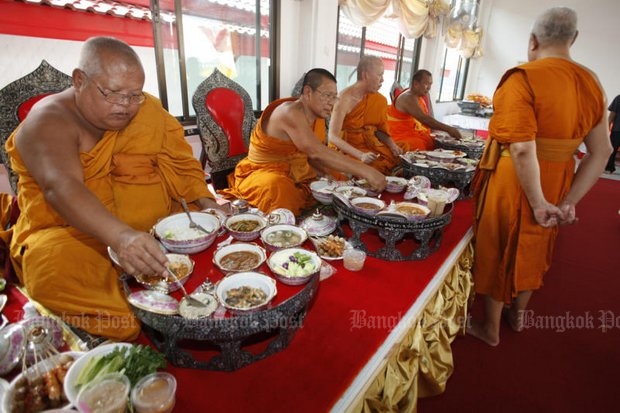
A study showing nearly half the monkhood is obese has prompted officials to launch a campaign to help monks lead healthy lives and reduce medical fees.
Jongjit Angkatavanich, an academic from Chulalongkorn University's Faculty of Allied Health Sciences, said the study showed 48% of monks suffered from obesity, one of the leading causes of serious health problems.
About 42% of monks had high levels of cholesterol, 23% had high blood pressure levels and about 10.4% were diabetic, the study found.
She did not reveal how many monks were involved in the study.
Waistline measurement was an indicator of health risk, said Ms Jongjit, who is an expert in nutrition and dietetics.
Larger waists were closely associated with certain health problems, she said adding monks found to have larger waists had higher levels of glucose and lipids in their blood.
She said obese monks were found to be suffering from more than one chronic disease, according to the study.
"Obesity in our monks is a ticking time bomb," Dr Jongjit said.
Each year, the government has to cover medical costs for monks who suffer from obesity and chronic diseases, she said.
Expenses for monks who had received treatment associated with obesity and chronic diseases from state-run hospitals came to more than 300 million baht in 2012.
According to the study, factors that improved the health of monks were pana water (a special drink for monks), weight loss around the waist and physical activity.
Monks tend to drink juices, instant tea and coffee offered by the faithful, Ms Jongjit said, adding these were loaded with sugar and were high in energy.
Dishes such as Kaeng kaew wan, tod mun, thong yib, foy thong and khaotommud which were laden with fat and sugar were popular items that faithful offered to monks.
Thus, the university and its networks have launched the campaign to promote a healthy balanced diet among monks nationwide, she said.
Knowledge on nutrition and how to create healthy meals was also passed on to the monks.
Activities were held for Buddhist faithful to raise awareness about the monks' health problems as part of the campaign.
These included nutrition training programmes for cooks and officials at Mahachulalongkornrajavidyalaya University where more than 300 monks reside to attend religious programmes.
Ms Jongjit said her team directed the programme over eight weeks for a total of 82 monks from four temples in Bangkok who had health problems including obesity.
Healthy meals with added protein and fibre were prepared for the monks.
The meals also included food rich in calcium, she said.
Monks, especially those who led sedentary lives, were also urged to increase their physical activity during the programme, she added.
The results were satisfactory since the monks' overall health had improved, Ms Jongjit said. They showed monks lost 1kg on average and their waistlines were reduced by 1.4 cm, she said.
They also saw a drop in cholesterol levels and triglyceride levels.
The deputy chief nurse at the Mitrapap Bumbud centre of Chulalongkorn Memorial Hospital, Manee Suesongtham, said monks who were not well informed about nutrition tend to suffer from diseases.
Mrs Manee said officials supported monks wearing a girdle cloth, (pra kod) a tight-fitting foundation garment around their waist as a reminder of the need to manage their weight.
Phra Maha Narong, from Wat Maha Pruettharam, claimed he lost about 10kg after taking part in the campaign.
He said he had tried to cut down on high-energy drinks and eat smaller portions of food high in sugar and fat.
He tried to eat in moderation, he added.
He paid more attention to his food when the girdle-cloth he wore stretched, signalling he had gained weight.
It's a monk's responsibility to watch what he eats, Phra Maha Narong said, adding monks were not allowed to reject food offered by faithful.
A knowledgeable monk knows what kind of food has a good effect on his health and what is bad for him, he said.



